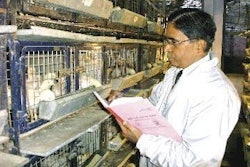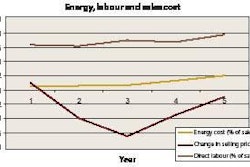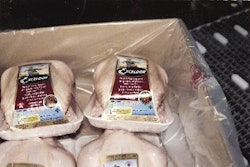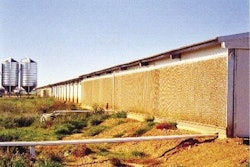Encouraged by politicians and animal welfare groups, UK consumers have steadily increased their purchases of organic and free-range poultry products. Perceived benefit of a healthier lifestyle from eating organic and free-range poultrymeat and eggs has played an important part in boosting sales. However, there is no scientific evidence of significant superiority in nutritional benefit of organic/free range poultry over those produced in more intensive systems.
In 1998, free-range eggs accounted for just 13 percent of the UK market but today they take over 30 percent of a larger market. Together with organic eggs, they represent well over one-third of the UK egg market. Over this nine-year period, the premium on free-range eggs over cage eggs has doubled in real terms.
Free-range and organic poultrymeat – although off to slower starts – are making significant inroads, helped by factory-farm food scares like the H5N1 outbreak at the huge Bernard Matthews turkey farm in Suffolk. The UK is the second largest market for organic meat in the world. Poultrymeat consumption is increasing at around 20 percent per year and rapidly becoming the largest sector of this organic market.
Current focus on carbon emissions and carbon ‘footprints’ ought to fit in well with current scene and scenario of contented birds foraging outdoors, enhancing the environment and producing meat and eggs sold and consumed locally. But The Shopping Trolley Report commissioned by DEFRA (Department for the Environment Food and Rural Affairs) has re-ignited environmental arguments surrounding different farming methods in the most unexpected way.
According to this report drawn up by Manchester Business School, purchasing locally grown organic food may be more damaging to the environment than going to the supermarket and buying items flown in from the other side of the world. The report claims to have calculated every aspect of a food product’s environmental impact by conducting a so called ‘life cycle analysis’.
Its authors looked at 150 of the best selling foods on supermarket shelves but findings relating to poultry were some of the most illuminating and interesting. Carbon emissions for every one kilogramme of poultrymeat (chicken) produced are 6.68kg, 5.48kg and 4.57kg for organic, free-range and intensively reared birds, respectively. Energy consumption value in megajoules (MJ) ranks in the same order as 16MJ, 15MJ and 12MJ/kg product.
Organic poultry came out worse for eutrophication (potential for nutrient-rich by-products to pollute water courses) and depletion of natural resources. Organic, free-range and intensively reared broilers scored, respectively, 86, 69 and 49 for eutrophication, 99, 75 and 29 for depletion of natural resources. The higher environmental impact of organic poultry was ascribed to birds taking longer to reach slaughter weight and displaying a less efficient feed conversion ratio.
The Soil Association – the UK’s main UK environmental organisation) – criticised the report for ignoring the many benefits of organic production such as improving biodiversity because small-scale organic and free-range poultry farming play a key role in maintaining the widest range of poultry breeds.
Report authors were also accused of relying on information from inappropriate studies on organic farming systems and methods not used in the UK. A large proportion of information used to arrive at final figures and develop arguments was sourced from the Danish Life Cycle Assessment Food Database, containing data on basic food production and consumption in Denmark. Other information used (some more than 10 years old) came from the United States.
For some foods, the authors suggested walking to the supermarket to buy intensively-produced bulk-transported food may be the best way to minimise the carbon footprints of food production and consumption. However, it is unclear whether authors factored in medical expenses incurred from carrying home 10kg frozen turkeys.
That said, there appears to be something for everyone in the report as far as the poultry industry is concerned. Producers of intensively reared broilers and cage eggs much maligned by environmental and animal welfare lobbies are offered some relief. For carbon emissions only, opting for turkey factory-farmed in Brazil and shipped frozen to the UK may be more environmentally friendly than buying fresh organic turkey reared in the English countryside.
However, it will take a lot more than this report to halt current UK consumer trends to organic and free-range poultrymeat and eggs. These are still perceived to be environmentally benign, bird-friendly and to provide a healthier and nutritionally-superior eating experience and lifestyle.
Considering the carbon emissions from London traffic, no one in their right mind would quibble over a few hens roaming sun-lit green fields in the English countryside. Organic and free-range hens will not feel guilty about their bigger ‘carbon footprints’ but presumably they enjoy the experience.


















